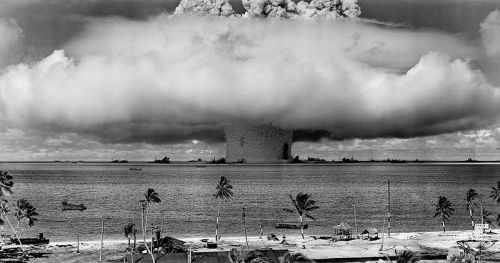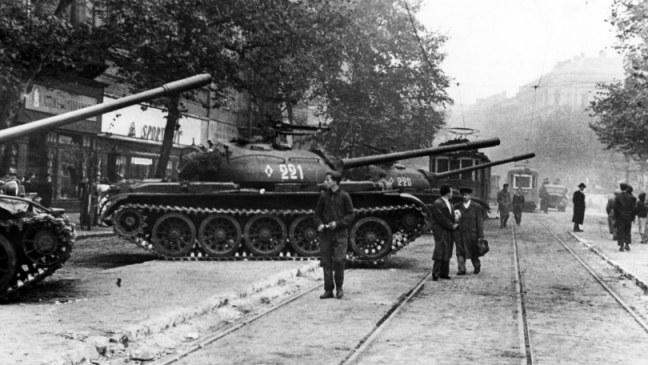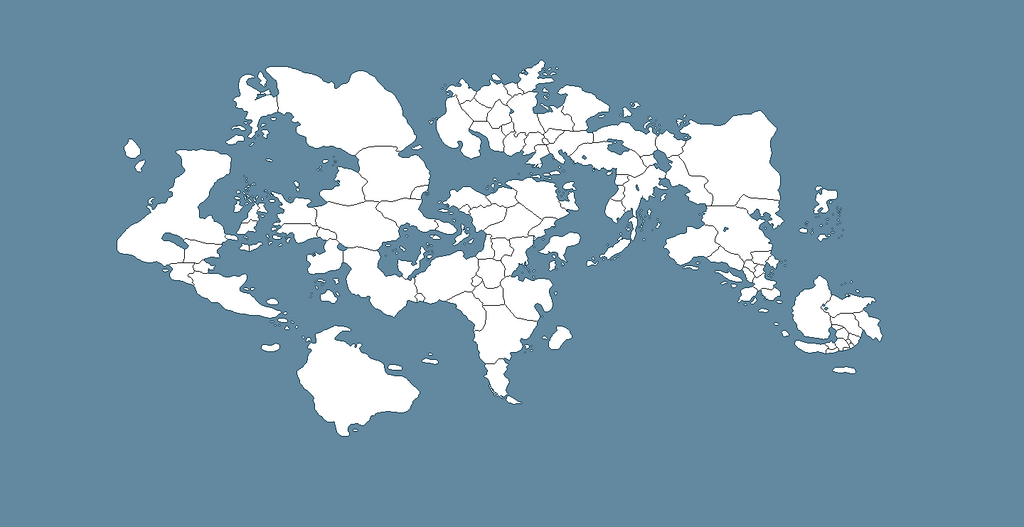RP Chat - No account needed, web-based.

The "Baker" explosion, part of Operation Crossroads, a nuclear weapon test by the United States military
Bikini Atoll, Micronesia, July 25th 1946
A massive version of the above photo is here

The "Baker" explosion, part of Operation Crossroads, a nuclear weapon test by the United States military
Bikini Atoll, Micronesia, July 25th 1946
A massive version of the above photo is here
TL;DR Summary
- GM's are @HeySeuss and @Sini.
- Late 1940’s, Cold War, era.
- Alternate World and fictional nations.
- A world war just ended. There is a surplus of weaponry and the victors are now dividing the spoils.
- Economies are in tatters, empires teeter precariously.
- Ideological conflict by proxy rather than epic world war; largely because epic world war = radioactive, lifeless rockball.
- There is a UN-style group called the World Conclave; it is structured similarly to the UN, with the veto system.
- Players should realize that open conflict between nations is going to be stopped, with the exception of internal (colonial) conflicts.
- The RP is not about your unproven strategic genius/e-peen. OOC needs to be civil.
In Character Info
The world is a scarier place than it used to be; it is smaller and more deadly. The advent of the nuclear age leaves the entire world under the shadow of the Sword of Damocles, and there is the heightened terror that some dictator, demagogue or madman might decide to press the button and start a conflict that would destroy all. The big players eye each other warily and jockey for improved strategic position, trying to deny each other assets and contain each other's power, but it is an indirect process of using proxies, spies and playing diplomatic games. The World Conclave is proposed as an idealistic attempt to mediate disputes that has become, in the eyes of many, a joke, or a pawn of one power or another. Nonetheless, the first meeting is about to start, in 1946.
Very rarely do they actually agree on anything, but when they do it is often a measure to keep smaller countries from becoming rivals. The World Conclave has yet to hold its first meeting, but the Executive Chamber is already created, and has strong veto powers over what the General Assembly comes up with.
Meanwhile, smaller countries are caught in the wake of the movements of greater powers. As one era ends and another begins, these smaller nations often find themselves still formally as colonies of the mother countries, not yet sovereign. They have to liberate themselves somehow, and are presented with choices; revolt or negotiation. They are often the battlegrounds of the era, where ideological conflict by proxy between factions supported by the main superpowers tear these smaller countries apart. Nationalists, communists, royalists, colonists, natives, theocrats, terrorists, guerrillas, rebels...the works, supported by this power or that, with the partners giving lip service to the values of their patrons, or worse, perhaps holding with the often-extreme ideologies.
Very rarely do they actually agree on anything, but when they do it is often a measure to keep smaller countries from becoming rivals. The World Conclave has yet to hold its first meeting, but the Executive Chamber is already created, and has strong veto powers over what the General Assembly comes up with.
Meanwhile, smaller countries are caught in the wake of the movements of greater powers. As one era ends and another begins, these smaller nations often find themselves still formally as colonies of the mother countries, not yet sovereign. They have to liberate themselves somehow, and are presented with choices; revolt or negotiation. They are often the battlegrounds of the era, where ideological conflict by proxy between factions supported by the main superpowers tear these smaller countries apart. Nationalists, communists, royalists, colonists, natives, theocrats, terrorists, guerrillas, rebels...the works, supported by this power or that, with the partners giving lip service to the values of their patrons, or worse, perhaps holding with the often-extreme ideologies.
Out of Character Info
Players are basically thrust into this highly delicate political situation as either the superpowers (I'm limiting that to three or four player-controlled ones) and many smaller powers -- this isn't about e-peen size, and the reality is that the smaller nations are going to get to have more of the action.
On the other hand, there will be no WWIII without a lot of groundwork and escalation involved. The typical war of the era is a low-intensity conflict, an insurgency or 'police action' type of war that involves limited objectives and attempts to win the hearts and minds of the people living in a given country. It involves diplomacy and deception, the providing of aid in its various forms to win over against the enemy, whose proxies are receiving the same. Invasions by nations are stymied by the World Conclave's Executive Chamber without a good reason; not that this stops foreign 'interventions' and 'occupations' of destabilized regions in order to 'promote security.'
Technology should be late 1940’s technology; it's highly transitional because technologies developed hastily during the war are now being refined and studied at a more leisurely pace. Computers are just getting started, rocketry is still being developed, jets are being cranked off the production line and then being taken out of service as better jets suddenly come off the assembly line. Nukes, of course, were just used to end the last war. Weaponry is a mix of the old and the new as armies upgrade and learn new lessons. So much is untested theory at this point that it's unclear how effective things are until they've been tried. That means stuff might fail in combat, or doctrines come up short. This is going to be known as the 'Shit Happens' factor in this RP. ;) It will be a random factor as well as a regulatory measure to keep people from getting too overconfident that everything will go off with a hitch; the big lesson of this period in history is, after all, that nothing is terribly certain.
There's also the fear of nuclear annihilation; Mutually Assured Destruction (MAD) that makes powers tentative about fighting; a smaller power knows that to provoke a larger may well elicit a nuclear response, whereas the larger powers are loathe to use the weapons, even on a smaller power, lest the enemy misread the intentions and respond in kind with a world-destroying counterstrike.
To make things interesting, we're using a random roll system to determine certain essentials about people's nations -- we will roll on a random table to determine the makeup of a nation's military and its economy. That means that people have to work with what they get rather than what they wish they had, which makes for a more interesting simulation RP. We like to think that this challenges people on a whole new level to expand their horizons in playing a nation. You work with what you have, not what you wish for.
On the other hand, there will be no WWIII without a lot of groundwork and escalation involved. The typical war of the era is a low-intensity conflict, an insurgency or 'police action' type of war that involves limited objectives and attempts to win the hearts and minds of the people living in a given country. It involves diplomacy and deception, the providing of aid in its various forms to win over against the enemy, whose proxies are receiving the same. Invasions by nations are stymied by the World Conclave's Executive Chamber without a good reason; not that this stops foreign 'interventions' and 'occupations' of destabilized regions in order to 'promote security.'
Technology should be late 1940’s technology; it's highly transitional because technologies developed hastily during the war are now being refined and studied at a more leisurely pace. Computers are just getting started, rocketry is still being developed, jets are being cranked off the production line and then being taken out of service as better jets suddenly come off the assembly line. Nukes, of course, were just used to end the last war. Weaponry is a mix of the old and the new as armies upgrade and learn new lessons. So much is untested theory at this point that it's unclear how effective things are until they've been tried. That means stuff might fail in combat, or doctrines come up short. This is going to be known as the 'Shit Happens' factor in this RP. ;) It will be a random factor as well as a regulatory measure to keep people from getting too overconfident that everything will go off with a hitch; the big lesson of this period in history is, after all, that nothing is terribly certain.
There's also the fear of nuclear annihilation; Mutually Assured Destruction (MAD) that makes powers tentative about fighting; a smaller power knows that to provoke a larger may well elicit a nuclear response, whereas the larger powers are loathe to use the weapons, even on a smaller power, lest the enemy misread the intentions and respond in kind with a world-destroying counterstrike.
To make things interesting, we're using a random roll system to determine certain essentials about people's nations -- we will roll on a random table to determine the makeup of a nation's military and its economy. That means that people have to work with what they get rather than what they wish they had, which makes for a more interesting simulation RP. We like to think that this challenges people on a whole new level to expand their horizons in playing a nation. You work with what you have, not what you wish for.
Requested Roles
– 2 World Powers, one of which needs to be an economic and industrial powerhouse and the other should be deeply concerned about its security. Yes, we need a US and a Soviet Union.
– 4-6 Secondary Powers, including nations defeated in the war or just bled white during the war. Countries that have a lot of rebuilding to do.
– Regional Powers, including prosperous colonies. This also includes national liberation movements that are, in all likelihood, going to probably achieve their aims either through negotiation with their imperial power or by a guerrilla war of national liberation.
– 4-6 Secondary Powers, including nations defeated in the war or just bled white during the war. Countries that have a lot of rebuilding to do.
– Regional Powers, including prosperous colonies. This also includes national liberation movements that are, in all likelihood, going to probably achieve their aims either through negotiation with their imperial power or by a guerrilla war of national liberation.

Three B-52Bs of the 93rd Bomb Wing prepare to depart for Castle Air Force Base, Calif., after their record-setting round-the-world flight in 1957

Soviet tanks in Budapest, Hungary, during the 1956 uprising.

Soviet and American forces face off at Checkpoint Charlie, Berlin, 1961

Fidel Castro, Che Guevara and other members of the July 26th movement right after Batista is overthrown in Cuba, 1959
1x Like



